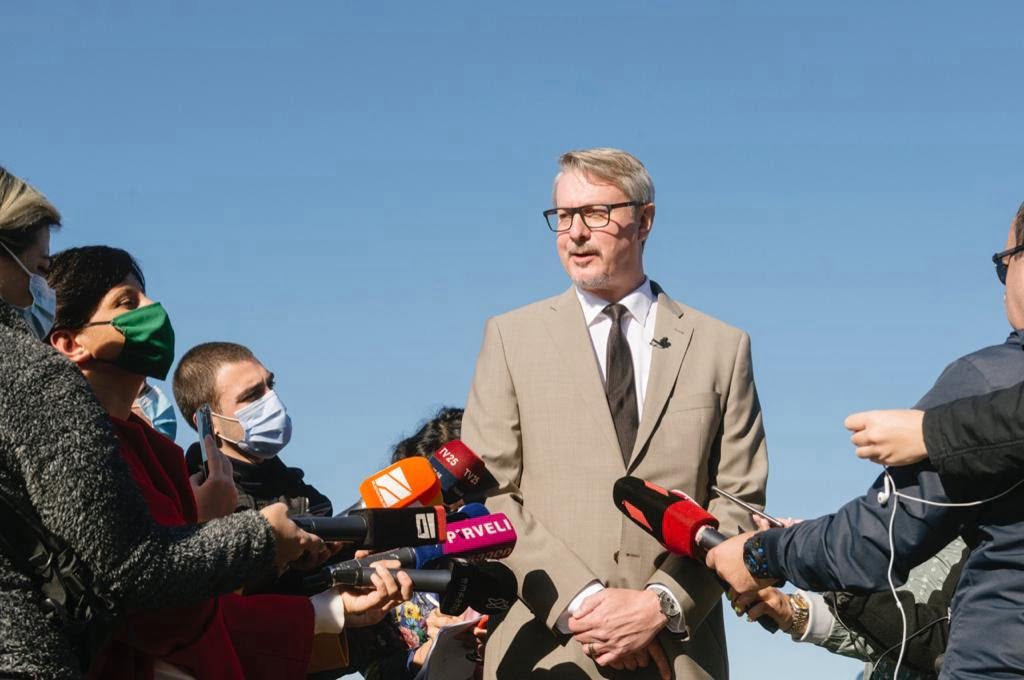EU Ambassador Carl Hartzell said Georgia could have been “better prepared” for its membership bid, “as it comes at a time when the EU is increasingly concerned about the country’s current trajectory.”
“Following an effective slow-down of the reform pace over recent years – partly due to consecutive political crises for which all sides bear their part of the responsibility – over these past months, questions have been raised about where Georgia is heading,” the diplomat noted.
In this context, the Ambassador said that the EU has publicly reacted to a number of developments in 2021 “with questions over the trend in the conduct of democratic elections; the July 5 violence and its follow-up, with implications for the rights of minorities and protection of journalists; several actions taken that run counter to building trust in the judiciary and the rule of law; wiretapping practices vs. human rights, including the right to privacy; and the dismantlement of the State Inspector’s Service, putting into question the respect for democratic institutions and proper democratic oversight mechanisms.”
“These are not… developments of marginal importance,” the diplomat said in his keynote speech at the conference “New Security Architecture in Europe and its Impact on Georgia,” organized by several CSOs. “They all relate directly to the key values of the European Union, as formulated in Article 2 of the Treaty on European Union.”
“However you may wish to explain away some of these developments – as some do – there is no going around the fact that a change is needed,” he added. “Perceptions matter, trends matter, and Georgia must aim to bring itself back to the position of the region’s best performer and reformer – for which it has every opportunity and even a track record to prove it.”
“The bad news is that you cannot count on anyone else to do this work for you. The good news is that you don’t have to, as these decisions are principally in your own hands,” the Ambassador asserted.
The diplomat also said that decisions taken by the EU member states, consequences of Russia’s war against Ukraine and other future developments in Europe and in the world will also have an impact on Georgia’s membership bid. “But as history has shown, this process begins and ends with your determination and your actions,” he added.
“No matter” the EU’s decision on Georgia’s candidacy, Ambassador Hartzell stressed, the 27-member-bloc will remain ready to assist the country to assist in advancing its European agenda.
“We want Georgia to find its rightful place in Europe and the world,” he said, adding “so just help us to help you!”
In his lengthy speech, the diplomat said that while Georgia has made good progress on reforms over many years and has enjoyed the title of “Eastern Partnership frontrunner,” its EU membership bid has “also raised the stakes.”
He noted that the member states have “invested heavily into the European Union, to create the world’s biggest internal market, becoming the world’s biggest trade actor, and the biggest global development assistance donor.”
Over the past decades, the member states have also pooled their foreign and security policy instruments, currently employed in response to Russia’s war in Ukraine.
These investments are what “is at stake here,” he noted. “This is why any new member is not only expected to adhere fully to our values and standards, but in the end also to contribute to making the European Union even stronger.”
“Progress on EU enlargement is, in other words, not a measurement of the degree of affection that the EU feels towards a candidate country,” Ambassador Hartzell stressed. “It is a measurement of the determination and ability of that candidate country to take the decisions and make the reforms necessary to advance credibly and irreversibly on its European path.”
“Time for Georgia to get to work”
The EU Ambassador said that whatever the outcome of Georgia’s request for candidacy may be – “less than hoped for, more than expected, with or without specific conditions – the conclusion to be drawn in all cases must be that now is the time for Georgia to get to work!”
“Whether that work will be to catch up with a train that has started to leave the station, or to make sure that the train ticket obtained will take you to the next station, Georgia needs to step up actions to deliver seriously – and sustainably – on what is needed to make a credible bid for future EU membership.”
The EU diplomat said that while unity — “needed for success” — is less of a problem among political parties on substance considering united calls for Georgia’s EU membership perspective, “the real problem is to get everyone into the same room when making these calls and formulating together the agenda ahead.”
“I am not naïve about the challenge to build a political culture of listening to each other, rather than branding each other as slaves, war-mongers, Putinists, traitors or simply quote-unquote “not interesting,” Ambassador Hartzell pointed out. “But this challenge must somehow be overcome.”
“Now is not the moment to prepare for a possible blame game, but to prepare for the long game,” he stressed.
Also Read:
- GD Chair Claims Opposition Campaigns Against Georgia’s EU Candidacy
- GD: Saakashvili Returned to Drag Georgia into Forthcoming Ukraine War
This post is also available in: ქართული (Georgian) Русский (Russian)

